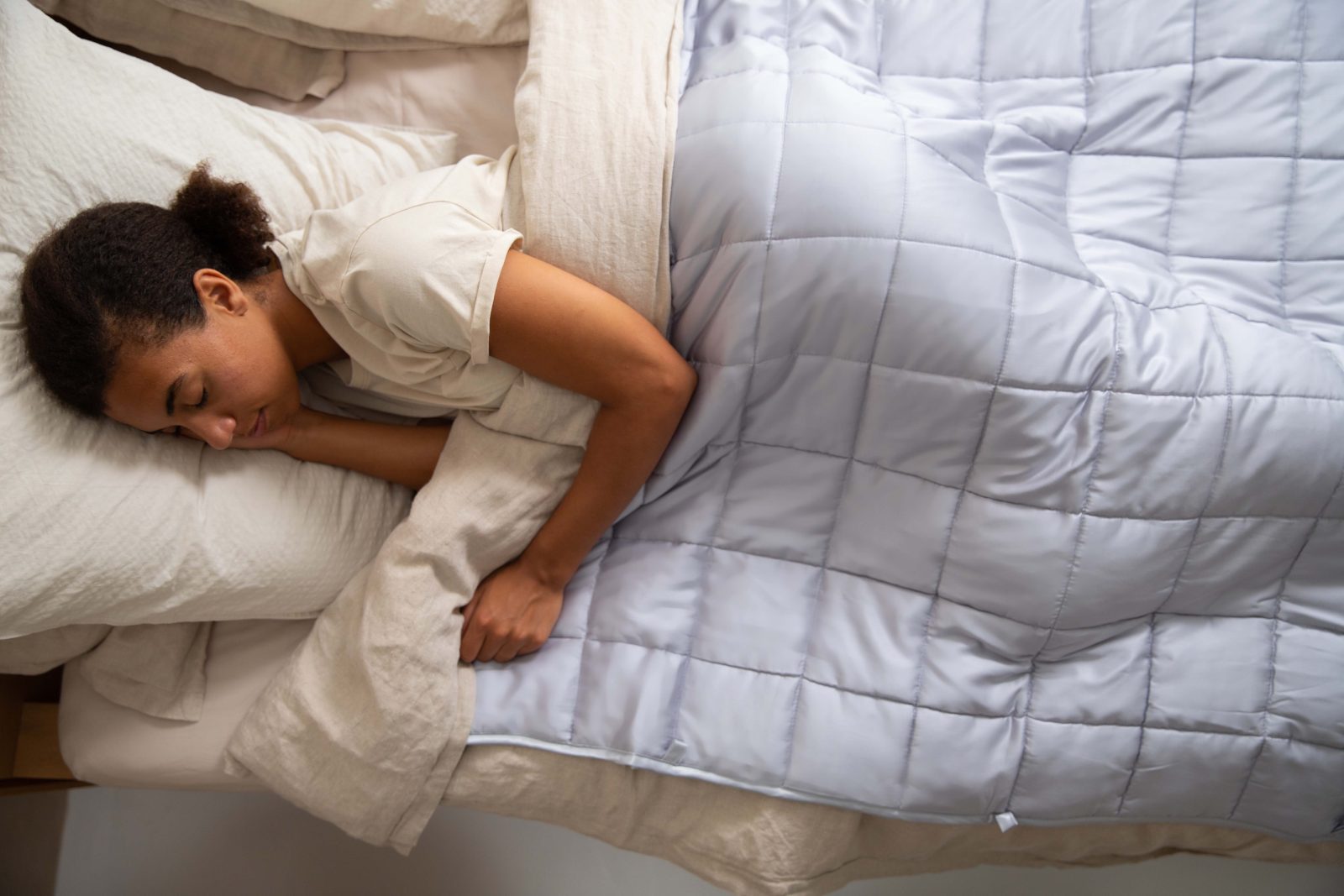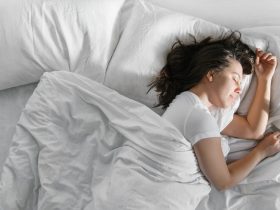Enhancing sleep quality can be achieved by making lifestyle and dietary adjustments. Additionally, certain natural remedies and supplements may prove beneficial.
Quality sleep is equally significant as regular exercise and a well-balanced diet. Scientific research has demonstrated that inadequate sleep can have immediate adverse effects on hormone balance, exercise performance, and cognitive function. It may also contribute to weight gain and increase the risk of various health conditions in both adults and children.
Conversely, sound sleep can help regulate appetite, improve physical activity, and promote overall well-being. Unfortunately, sleep quality and duration have declined over recent decades, with a significant portion of the population experiencing sleep-related issues.
Whether you’re aiming to enhance your overall health or achieve weight management goals, prioritizing a good night’s sleep is a crucial step. Below, you’ll find 17 evidence-backed strategies to help you achieve better sleep at night.
Boost Daytime Bright Light Exposure
Your body operates on a natural internal clock known as the circadian rhythm, which influences various functions such as alertness and sleep-wake cycles.
To keep your circadian rhythm in good health, exposure to natural sunlight or bright light during the daytime is crucial. This not only enhances your daytime vitality but also contributes to better nighttime sleep quality and duration.
Studies have shown that individuals with insomnia experienced improvements in sleep quality and duration when exposed to bright light during the day. In fact, it reduced the time it took for them to fall asleep by an impressive 83%.
Similarly, in the case of older adults, a study demonstrated that two hours of daytime bright light exposure increased total sleep duration by two hours and improved sleep efficiency by 80%.
While much of the research has focused on individuals with severe sleep disturbances, incorporating daily light exposure can likely benefit even those with typical sleep patterns.
Consider spending time in natural sunlight each day, and if this isn’t feasible, you can opt for an artificial bright light device or light bulbs to help maintain a healthy circadian rhythm.
Minimize Evening Blue Light Exposure
While daytime light exposure offers benefits, exposure to light at night can have detrimental effects on your sleep.
This occurs because nighttime light exposure disrupts your circadian rhythm, fooling your brain into thinking it’s still daytime. This leads to a reduction in the production of sleep-inducing hormones like melatonin.
Among all types of light, blue light is particularly problematic, and it’s emitted in significant amounts by electronic devices such as smartphones and computers.
To reduce your exposure to nighttime blue light, you can employ a variety of popular methods, including:
- Use glasses designed to block blue light.
- Download a blue light-blocking application like f.lux for your laptop or computer.
- Install an app on your smartphone that blocks blue light, available for both
- iPhone and Android devices.
- Refrain from watching television and turn off bright lights at least 2 hours before bedtime.
Avoid Late-Day Caffeine Intake
Caffeine is widely consumed and offers various benefits, including improved focus, energy, and sports performance, with around 90% of the U.S. population using it.
However, when consumed later in the day, caffeine can stimulate your nervous system and disrupt your body’s natural ability to unwind at night.
A study showed that even caffeine intake up to 6 hours before bedtime significantly reduced sleep quality.
Caffeine remains in your bloodstream for 6–8 hours, so it’s advisable to avoid consuming large amounts of coffee after 3–4 p.m., especially if you are sensitive to caffeine or have difficulty sleeping.
If you still desire a coffee in the late afternoon or evening, opt for decaffeinated coffee as an alternative.
Limit Prolonged or Inconsistent Daytime Naps
Short power naps can be rejuvenating, but excessively long or irregular daytime napping may disrupt your nighttime sleep.
Daytime slumber can potentially confuse your internal sleep-wake clock, making it challenging to fall asleep at night.
In a study, participants who engaged in daytime napping ended up feeling sleepier during the day.
Furthermore, research suggests that while brief naps of 30 minutes or less can boost daytime cognitive function, extended naps may have adverse effects on overall health and sleep quality.
However, it’s worth noting that some studies indicate that individuals accustomed to regular daytime naps may not necessarily experience poor sleep quality or nighttime disruptions.
If you regularly take daytime naps and enjoy restful nighttime sleep, there’s generally no need for concern. The impact of napping can vary from person to person.
Maintain a Consistent Sleep-Wake Schedule
Your body’s circadian rhythm operates in a predictable pattern, synchronized with the natural cycle of day and night.
Consistently adhering to a set schedule for both sleep and wake times can contribute to improved long-term sleep quality.
In a study, individuals with irregular sleep patterns who stayed up late on weekends reported experiencing poor sleep.
Other research has emphasized that irregular sleep schedules can disrupt your circadian rhythm and influence melatonin levels, the hormone that signals your brain when it’s time to sleep.
If you find it challenging to achieve restful sleep, consider establishing a routine where you wake up and go to bed at the same times each day. Over time, your body may naturally adjust, and you may even wake up without the need for an alarm clock.
Consider Taking a Melatonin Supplement
Melatonin, a vital sleep hormone, signals to your brain when it’s time to unwind and prepare for sleep.
Melatonin supplements are widely popular as a sleep aid and are often employed to manage insomnia. They can be a straightforward way to facilitate quicker sleep onset.
In one study, individuals who took a 2 mg melatonin supplement before bedtime reported improvements in sleep quality, increased daytime energy levels, and a reduced time to fall asleep. Another study found that half of the participants experienced faster sleep onset and a 15% enhancement in sleep quality after melatonin supplementation.
It’s worth noting that neither of these studies reported any withdrawal effects associated with melatonin use.
Melatonin can also be beneficial when you’re traveling and need to adjust to a new time zone, as it helps reset your body’s circadian rhythm.
The availability of melatonin supplements varies by country; in some places, a prescription is necessary, while in others, they can be readily purchased in stores or online. For best results, take around 1–5 mg approximately 30–60 minutes before bedtime.
Starting with a lower dose and gradually increasing it as needed is advisable to gauge your tolerance. Because melatonin may have an impact on brain chemistry, it’s a good idea to consult with a healthcare provider before use.
If you’re considering melatonin as a sleep aid for your child, it’s essential to seek professional guidance, as the long-term use of this supplement in children hasn’t been extensively studied.
Explore melatonin supplements online to find options that suit your needs.
Explore These Additional Supplements
Several supplements are known for their potential to promote relaxation and improve sleep quality. Here are some options to consider:
Ginkgo Biloba: This natural herb offers various benefits, including potential support for sleep, relaxation, and stress reduction. Keep in mind that the evidence is somewhat limited. Consider taking 250 mg of Ginkgo biloba approximately 30–60 minutes before bedtime.
Glycine: Studies suggest that consuming 3 grams of the amino acid glycine may enhance sleep quality.
Valerian Root: Valerian root has been the subject of several studies, with results indicating its ability to help you fall asleep more easily and improve overall sleep quality. You can try taking 500 mg before bedtime.
Magnesium: Magnesium plays a crucial role in over 600 bodily processes and can contribute to relaxation and improved sleep quality.
L-Theanine: As an amino acid, L-theanine has the potential to enhance relaxation and promote better sleep. A dose of 100–200 mg before bedtime may be beneficial.
Lavender: Lavender is a potent herb with numerous health benefits, including its ability to induce a calming and sedative effect that can lead to better sleep. Consider taking 80–160 mg of lavender containing 25–46% linalool.
It’s important to introduce these supplements into your routine one at a time to monitor their individual effects. While they may not provide an instant solution to sleep issues, they can complement other natural sleep-enhancing strategies effectively.
Avoid Alcohol Consumption
Consuming alcohol in the evening can have adverse effects on your sleep and hormonal balance.
Alcohol is recognized for its potential to induce or exacerbate issues like sleep apnea, snoring, and disturbances in sleep patterns.
Furthermore, it disrupts the natural production of melatonin during nighttime, a hormone crucial for regulating your body’s circadian rhythm.
An additional study revealed that alcohol intake at night led to a reduction in the natural nighttime surges of human growth hormone (HGH), a hormone vital for your circadian rhythm and various other essential bodily functions.
Enhance Your Bedroom Setting
Many individuals believe that the ambiance and arrangement of the bedroom play pivotal roles in ensuring a restful night’s sleep.
These factors encompass temperature, noise levels, external lighting, and the layout of furniture.
Numerous research studies have emphasized that external disturbances, frequently stemming from sources like traffic noise, can lead to subpar sleep and potential long-term health consequences.
In a study examining women’s bedroom environments, approximately half of the participants reported improved sleep quality when noise and light levels were reduced.
To optimize your bedroom setting, consider minimizing external noise, light, and the glow from electronic devices such as alarm clocks. Ensure that your bedroom provides a tranquil, soothing, neat, and pleasant atmosphere conducive to restful sleep.
Adjust Your Bedroom’s Temperature
Both your body temperature and the temperature of your bedroom can significantly impact the quality of your sleep.
As you might have encountered during the summer or in warm climates, achieving restful sleep can be quite challenging when the room is overly warm.
Research has shown that bedroom temperature can have a more profound effect on sleep quality than external noise.
Additionally, various studies have indicated that elevated body and bedroom temperatures can lead to diminished sleep quality and increased wakefulness.
Generally, around 70°F (20°C) tends to be a comfortable temperature for most individuals. However, it’s essential to consider your personal preferences and habits when setting your bedroom’s temperature.
Unwind and Calm Your Mind Before Bed
Numerous individuals have established pre-sleep routines to help them unwind.
Practicing relaxation techniques before bedtime has been proven to enhance sleep quality and is a widely employed approach for managing insomnia.
For instance, a study demonstrated that a soothing massage enhanced sleep quality in individuals with health issues.
There are various strategies to choose from, including listening to calming music, reading, taking a warm bath, engaging in meditation, practicing deep breathing exercises, and using visualization techniques.
Experiment with these methods to discover which one suits you best.
Enjoy a Soothing Bath or Shower
Taking a soothing bath or shower is another commonly used method to enhance sleep.
Research suggests that it can contribute to better overall sleep quality and assist individuals, particularly older adults, in falling asleep more swiftly.
For instance, in one study, taking a warm bath 90 minutes prior to bedtime enhanced sleep quality and increased the amount of deep sleep.
If you prefer not to take a full bath in the evening, soaking your feet in warm water can also promote relaxation and improve sleep.
Consider the Possibility of a Sleep Disorder
Sleep disorders could be underlying factors contributing to your sleep difficulties.
One prevalent condition is sleep apnea, characterized by irregular and interrupted breathing during sleep. Individuals with this condition experience repeated episodes of breath cessation while asleep.
Surprisingly, sleep apnea might be more prevalent than you realize. According to one review, 24% of men and 9% of women may have sleep apnea.
Other frequently diagnosed medical conditions include sleep movement disorders and circadian rhythm sleep/wake disorders, particularly common among shift workers.
If you’ve been grappling with sleep issues for an extended period, it’s advisable to consult with a healthcare professional to explore potential underlying sleep disorders.
Invest in a Comfortable Bed, Mattress, and Pillow
Have you ever wondered why you tend to sleep better in a hotel room? Beyond the calming ambiance, the quality of your bed can significantly impact your sleep.
A study conducted over 28 days demonstrated the benefits of a new mattress, revealing a 57% reduction in back pain, a 60% decrease in shoulder pain, and a 59% improvement in back stiffness. Additionally, it led to a 60% enhancement in sleep quality.
Other research emphasizes the role of new bedding in improving sleep. Conversely, low-quality bedding can contribute to increased lower back pain.
Selecting the ideal mattress and bedding is highly subjective, so base your choice on personal preference. Experts recommend replacing your bedding every 5–8 years.
If you haven’t updated your mattress or bedding in a while, this relatively quick, albeit potentially costly, upgrade could make a significant difference in your sleep quality.
For recommendations, consider perusing our marketplace, featuring editor-approved and expert-verified pillow and mattress options.
Avoid Consuming Liquids Before Bedtime
Nocturia, or excessive nighttime urination, can significantly impact sleep quality and daytime energy levels.
While staying hydrated is important for your overall health, it’s advisable to reduce your fluid intake during the late evening hours.
It’s a good practice to refrain from drinking any liquids 1–2 hours before bedtime. Additionally, using the bathroom right before going to bed can help minimize the chances of waking up in the middle of the night to urinate.
In Summary
Sleep is a critical factor in maintaining good health.
A comprehensive review has highlighted that insufficient sleep can significantly raise the risk of obesity, with an 89% increase in children and a 55% increase in adults.
Numerous other studies have also shown that getting less than 7–8 hours of sleep per night can elevate your chances of developing heart disease and type 2 diabetes.
For those seeking optimal health and well-being, prioritizing quality sleep and implementing some of the tips mentioned above is strongly advised.
















Find Us on Socials